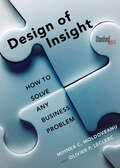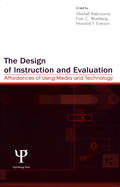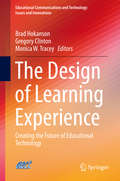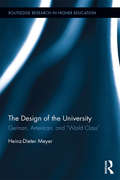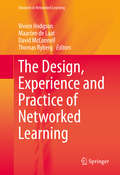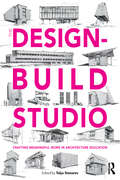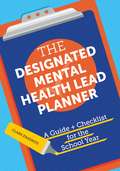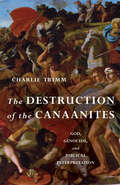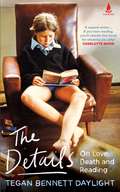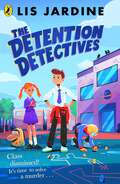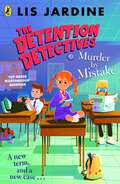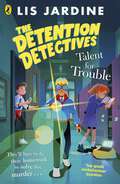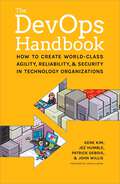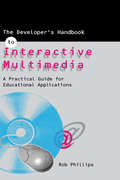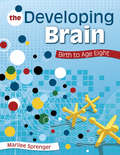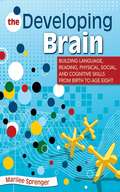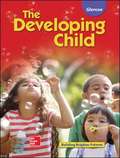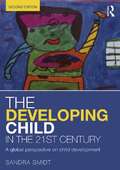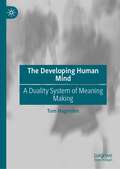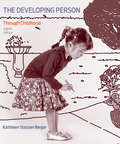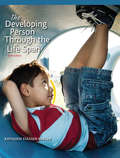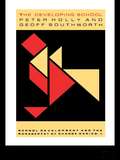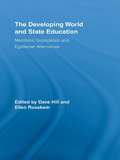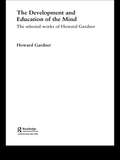- Table View
- List View
The Design of Insight: How to Solve Any Business Problem
by Mihnea C. Moldoveanu Olivier LeclercFamiliar modes of problem solving may be efficient, but they often prevent us from discovering innovative solutions to more complex problems. To create meaningful change, we must train ourselves to discover previously unseen variables in day-to-day challenges. The Design of Insight is intended to be a personal problem-solving platform for decision makers and advisors who seek answers to critical business questions. It introduces an approach that uses multiple "problem-solving languages" to systematically expand our understanding of problem framing and high quality problem solving. Useful as a critical thinking approach or a think-out-loud document for strategic teams, this brief is a resource for enriching and implementing thoughtful management practices.
The Design of Instruction and Evaluation: Affordances of Using Media and Technology
by Fran C. Blumberg Howard T. Everson Mitchell RabinowitzThis book is about empirically tested knowledge and principles that inform the design of instructional and evaluation systems, and the use and promise of media and technology within such systems. Historically, psychology has informed the design of instructional and evaluation systems in different ways. A behavioral perspective emphasizes the role of the environment in determining behavior--a factor external to the learner. A cognitive perspective focuses on the role of cognitive processing and constraints in determining learning--factors that are internal to the learner. This volume presents the affordances approach--which addresses how the environment and the affordances within it interact with cognitive processes to determine learning. Insights into this interaction are presented. It is the book's contention that the affordance approach represents an advancement over the behavioral and cognitive perspectives; it is an evolution within the cognitive approach--not an alternative to it. The Design of Instruction and Evaluation: Affordances of Using Media and Technology is intended for education practitioners responsible for the implementation of media and technology in classrooms, for researchers and faculty, and for use as a text in courses on media and technology use in educational settings, instructional design, and psychology of learning.
The Design of Learning Experience
by Monica W. Tracey Brad Hokanson Gregory ClintonThis book delves into two divergent, yet parallel themes; first is an examination of how educators can design the experiences of learning, with a focus on the learner and the end results of education; and second, how educators learn to design educational products, processes and experiences. The book seeks to understand how to design how learning occurs, both in the instructional design studio and as learning occurs throughout the world. This will change the area's semantics; at a deeper level, it will change its orientation from instructors and information to learners; and it will change how educators take advantage of new and old technologies. This book is the result of a research symposium sponsored by the Association for Educational Communications and Technology [AECT].
The Design of the University: German, American, and “World Class” (Routledge Research in Higher Education #26)
by Heinz-Dieter MeyerWhat is the reason for the American university’s global preeminence? How did the American university succeed where the development of the German university, from which it took so much, stalled? In this closely-argued book, Meyer suggests that the key to the American university’s success is its institutional design of self-government. Where other university systems are dependent on the patronage of state, church, or market, the American university is the first to achieve true autonomy, which it attained through an intricate system of engagements with societal actors and institutions that simultaneously act as amplifiers of its impact and as checks on the university’s ever-present corrosive tendencies. Built on a searching analysis of the design thinking of Wilhelm von Humboldt and Adam Smith and closely tracing the learning process by which Americans adapted the German model, The Design of the University dismisses efforts to copy superficial features of the American university in order to achieve world-class rank. Calling attention to the design details of the university and the particulars of its institutional environment, this volume identifies the practices and choices that produced the gold standard for today’s world class higher education.
The Design, Experience and Practice of Networked Learning
by David Mcconnell Vivien Hodgson Thomas Ryberg Maarten De LaatThe Design, Experience and Practice of Networked Learning Edited by: Vivien Hodgson, Maarten de Laat, David McConnell and Thomas Ryberg This book brings together a wealth of new research that opens up the meaning of connectivity as embodied and promised in the term ''networked learning''. Chapters explore how contexts, groups and environments can be connected rather than just learners; how messy, unexpected and emergent connections can be made rather than structured and predefined ones; and how technology connects us to learning and each other, but also shapes our identity. These exciting new perspectives ask us to look again at what we are connecting and to revel in new and emergent possibilities arising from the interplay of social actors, contexts, technologies, and learning. Caroline Haythornthwaite, University of British Columbia Despite creating fundamentally new educational economics and greatly increasing access - teaching and learning in networks is a tricky business. These chapters illuminate the complex interactions amongst tools, pedagogy, educational institutions and personal net presences - helping us design and redesign our own networks. In the process, they take (or extract) network theory from the practice of real teaching and learning contexts, making this collection an important contribution to Networked Learning. Terry Anderson, Athabasca University What kinds of learning can social networking platforms really enable? Digging well beneath the hype, this book provides a timely, incisive analysis of why and how learning emerges (or fails to) in networked spaces. The editors do a fine job in guiding the reader through the rich array of theories and methods for tackling this question, and the diverse contexts in which networked learning is now being studied. This is a book for reflective practitioners as well as academics: the book''s close attention to the political, pedagogical and organisational complexity of effective practice, and the lived experience of educators and learners, helps explain why networked learning has such disruptive potential -- but equally, why it draws resistance from the establishment. Simon Buckingham Shum, The Open University The networked learning conference, a biannual institution since 1998, celebrates its 14th year in this volume. Here a range of studies, reflecting networked learning experiments across Europe and other global contexts , show important shifts away from a conservative tradition of OEe-learning¹ research and unpeel dilemmas of promoting learning as an elusive practice in virtual environments. The authors point towards important futures in online learning research, where notions of knowledge, connectivity and OEcommunity¹ become increasingly elastic, and engagements slide across material and virtual domains in new practices whose emergence is increasingly difficult to apprehend. Tara Fenwick - University of Stirling. The chapters in this volume explore new and innovative ways of thinking about the nature of networked learning and its pedagogical values and beliefs. They pose a challenge to us to reflect on what we thought networked learning was 15 year ago, where it is today and where it is likely to be headed. Each chapter brings a particular perspective to the themes of design, experience and practice of networked learning, the chosen focus of the book. The chapters in the book embrace a wide field of educational areas including those of higher education, informal learning, work-based learning, continuing professional development, academic staff development, and management learning. The Design, Experience and Practice of Networked Learning will prove indispensable reading for researchers, teachers, consultants, and instructional designers in higher and continuing education; for those involved in staff and educational development, and for those studying post graduate qualifications in learning and teaching. This, the second volume in the Springer Book Series on Researching Networked Learning, is based on a selection of papers presented a...
The Design-Build Studio: Crafting Meaningful Work in Architecture Education
by Tolya StonorovThe Design-Build Studio examines sixteen international community driven design-build case studies through process and product, with preceding chapters on community involvement, digital and handcraft methodologies and a graphic Time Map. Together these projects serve as a field guide to the current trends in academic design-build studios, a window into the different processes and methodologies being taught and realized today. Design-build supports the idea that building, making and designing are intrinsic to each other: knowledge of one strengthens and informs the expression of the other. Hands-on learning through the act of building what you design translates theories and ideas into real world experience. The work chronicled in this book reveals how this type of applied knowledge grounds us in the physicality of the world in which we live.
The Designated Mental Health Lead Planner: A Guide and Checklist for the School Year
by Clare ErasmusThis planner provides detailed guidance on what a Designated Mental Health Lead needs to do, when they need to do it, and how they can achieve the best results. It gives a clear focus and checklist for each week, including spaces to add your own to-do list, and encourages reflection on the outcomes and impact of your actions on pupils' attainment and wellbeing. It also encourages a focus on your own development and self-care, with space to record what you are currently reading or listening to and one thing you are grateful for that week.In addition to the termly and weekly plans, the book provides short briefs on key aspects of the role, including how to work effectively with teachers, the HR team, the DSL, governors, the pastoral team, Mental Health Support Teams and parents. It is an invaluable resource for all DMHLs tackling the 39 academic weeks.
The Desire of Ages
by Ellen G. WhiteVolume 3 of the 'Conflict of the Ages' book series, 'The Desire of Ages,' covers the life and ministry of Jesus. This key Seventh Day Adventist text explains in detail the SDA understanding of the conflict between God and Satan and their understanding of the Bible and much of world history. White wrote the series based on her research of other authors and special information which she claimed to receive through visions from God. The books thus include unique insights and concepts not found in other works of the time.
The Destruction of the Canaanites: God, Genocide, and Biblical Interpretation
by Charlie TrimmHow can a good God command genocide? In this short, accessible offering, Charlie Trimm provides the resources needed to make sense of one of the Bible&’s most difficult ethical problems—the Israelite destruction of the Canaanites as told in the books of Deuteronomy, Joshua, and Judges. Trimm begins with a survey of important background issues, including the nature of warfare in the ancient Near East, the concept of genocide (with perspectives gleaned from the field of genocide studies), and the history and identity of the Canaanite people. With this foundation in place, he then introduces four possible approaches to reconciling biblical violence:Reevaluating God—concluding that God is not good.Reevaluating the Old Testament—concluding that the Old Testament is not actually a faithful record of God&’s actions.Reevaluating the interpretation of the Old Testament—concluding that the Old Testament does not in fact describe anything like genocide.Reevaluating the nature of violence in the Old Testament—concluding that the mass killing of the Canaanites in the Old Testament was permitted on that one occasion in history.The depth of material provided in concise form makes Trimm&’s book ideal as a supplementary textbook or as a primer for any Christian perturbed by the stories of the destruction of the Canaanites in the Old Testament.
The Details: On Love, Death and Reading
by Tegan Bennett DaylightA book about the connections we form with literature and each other Tegan Bennett Daylight has led a life in books – as a writer, a teacher and a critic, but first and foremost as a reader. In this deeply insightful and intimate work, Daylight describes how her reading has nourished her life, and how life has informed her reading. In both, she shows us that it&’s the small points of connection – the details – that really matter: what we notice when someone close to us dies, when we give birth, when we make friends. In life&’s disasters and delights, the details are what we can share and compare and carry with us. Daylight writes with invigorating candour and compassion about her mother&’s last days; her own experiences of childbearing and its aftermath (in her celebrated essay &‘Vagina&’); her long admiration of Helen Garner and George Saunders; and her great loves and friendships. Each chapter is a revelation, and a celebration of how books offer not an escape from &‘real life&’ but a richer engagement with the business of living. The result is a work that will truly deepen your relationship with books, and with other readers. The delight is in the details. &‘An intimate and wise celebration of the joy and solace we find in books.&’ Books & Publishing
The Detention Detectives (The Detention Detectives #1)
by Lis Jardine'Sharply drawn... convincingly humorous and stroppy' - The Guardian"Finding a dead body at my new school was a pretty rubbish way to start. But actually getting mixed up in the case? I was bound to get into deep, deep trouble for that!"Murder comes to Hanbridge High, and three Year Seven misfits want to solve the crime:New boy Jonno hopes playing detective will convince his parents that moving to Hanbridge was a big mistake.School reporter Lydia thinks her news story will sweep everything else off the front page.And young carer Daniel needs the police to arrest the right culprit - for his mum's sake.They may not be friends, but they're about to become. . .The Detention Detectives.'a fresh new take on the murder mystery genre' - The School Library Association'Friendship, trust, courage and determination are at the heart of this extremely funny murder-mystery tale' - BookTrustMisfits and murder meet in this brilliantly fun new mystery series by debut author Lis Jardine. A perfect next read for fans of Sharna Jackson's The High-Rise Mysteries, Fleur Hitchcock's Murder in Midwinter, and Robin Stevens' Murder Most Unladylike.
The Detention Detectives: Murder By Mistake (The Detention Detectives #2)
by Lis Jardine‘Top-grade misbehaviour’ – THE GUARDIANTHE DETENTION DETECTIVES ARE BACK! And there's been another murder...Headstrong LYDIA leads the new case. As a school reporter, she’s great at getting the facts. But when someone unexpected arrives at Gran’s, it’s clear she’s missing some clues…Sensitive DANIEL is convinced this case is linked to their first. As a young carer he’s got a lot on his plate, so he needs the trio to work on this together. He just needs to persuade…Not-so-new-boy JONNO, who’s settled in at Hanbridge High. But he’s so distracted by his new band – maybe solving crimes just isn’t cool anymore? Or maybe he’s scared of finding out the truth…Can you solve the case before THE DETENTION DETECTIVES?Praise for book one:'a fresh new take on the murder mystery genre' - The School Library Association'Friendship, trust, courage and determination are at the heart of this extremely funny murder-mystery tale' - BookTrust'Lis Jardine is an exciting new voice...This new school set crime series is well worth investigating' - LoveReading4Kids'splendidly assured' - The Guardian
The Detention Detectives: Talent for Trouble (The Detention Detectives)
by Lis JardineThe Detention Detectives may have solved their last mystery, but when a local teen disappears they suddenly realize the cases are connected. The problem is . . .Star Trek superfan DANIEL takes the lead, but his anger towards their main suspect might be getting in the way of their investigation.Music-lover JONNO is totally distracted by the school talent competition. And it may seem silly to the others, but Daniel’s got the people skills and Lydia’s got the brains - so do they even need him?School reporter LYDIA has a separate unsolved crime to deal with, and a newspaper to edit too! She really doesn’t have time for the boys’ dramas…Can Daniel bring the Detectives together to crack their BIGGEST case, before it’s too late?
The DevOps Handbook: How to Create World-Class Agility, Reliability, and Security in Technology Organizations
by Jez Humble John Willis Gene Kim Patrick DeboisIncrease profitability, elevate work culture, and exceed productivity goals through DevOps practices.More than ever, the effective management of technology is critical for business competitiveness. For decades, technology leaders have struggled to balance agility, reliability, and security. The consequences of failure have never been greater—whether it's the healthcare.gov debacle, cardholder data breaches, or missing the boat with Big Data in the cloud.And yet, high performers using DevOps principles, such as Google, Amazon, Facebook, Etsy, and Netflix, are routinely and reliably deploying code into production hundreds, or even thousands, of times per day.Following in the footsteps of The Phoenix Project, The DevOps Handbook shows leaders how to replicate these incredible outcomes, by showing how to integrate Product Management, Development, QA, IT Operations, and Information Security to elevate your company and win in the marketplace.
The Developer's Handbook of Interactive Multimedia
by Robin PhillipsNew technology is being used more and more in education and providers have to be aware of what is on offer and how it can be used. This practical handbook demonstrates how interactive multimedia can be developed for educational application.
The Developing Brain: Birth to Age Eight
by Marilee B. SprengerSynthesizing information from neuroscience, cognitive psychology, and child development, this reader-friendly guide explains the basics of early brain development and provides brain-compatible teaching practices.
The Developing Brain: Building Language, Reading, Physical, Social, and Cognitive Skills from Birth to Age Eight
by Marilee SprengerHow can early childhood teachers, administrators, and parents translate discoveries on early brain development into strategies that nurture cognitive growth? The key is to using the information gathered from neuroscience, cognitive psychology, and child development. The Developing Brain offers brain-compatible teaching practices for parents and teachers that are linked to principles for working with young children from the National Association for the Education of Young Children.Bestselling author Marilee Sprenger covers the basic structure, vocabulary, and current research on the brain from an early childhood educator's point of view and provides an abundance of illustrations and descriptions. This user-friendly guide includes:Background information on brain development from birth through age twoScenarios and snapshots of each year from age three through eightReproducible development checklistsOver one hundred brain-based activities for classroom or child care settingsAnd much more!Through an understanding of the phases of language, motor, and social development at each age level, The Developing Brain will help both educators and parents create an enriching educational experience that enhances a child's growth and fosters an enduring love of learning.
The Developing Child in the 21st Century: A global perspective on child development
by Sandra SmidtOffering a sociocultural approach to education and learning, this fascinating exploration of childhood provides an in-depth understanding of how children make sense of the world and the people in it. Examining the ways in which children express their thoughts, feelings and actively generate meaning through experience and interaction, this fully revised and updated new edition is illustrated throughout by extensive case studies and covers a diverse range of topics, including: socio-historical and global child development over time and place; the child as meaning-maker and active learner; learning in the context of family, culture, group, society; representing and re-representing the world; understanding roles, identity, race and gender; making sense of science and technology; the implications of neuroscience. Taking a clearly articulated and engaging perspective, Sandra Smidt draws upon multiple sources and ideas to illustrate many of the facets of the developing child in a contemporary context. She depicts children as symbol users, role-players, investigators and creative thinkers, and follows children's?progress in forming their understanding of their environment, asking questions about it, and expressing it through music, dance, art and constructive play. Highly accessible, and with points for reflection concluding each chapter, The Developing Child is essential reading for teachers, lecturers and students taking courses in early childhood, psychology or sociology.
The Developing Human Mind: A Duality System of Meaning Making
by Tom HagströmThis book proposes a developmental theory of human mind as a basic interaction system of meaning making elements - so called dualities - progressing in dialectical shifts towards higher self-awareness. It elaborates on why this system has developed evolutionary, how it develops in the life courses of humans in modern societies and what hampers and promotes its progression to meet contemporary and future societal challenges.
The Developing Person Through Childhood
by Kathleen Stassen BergerExceptional in its currency, global in its cultural reach, Kathleen Berger's portrait of the scientific investigation of childhood development is derived from her acclaimed bestselling text, The Developing Person through Childhood and Adolescence, offering the same features and media and the same committment to making the current state of child development theory and research accessible to all kinds of students. In addition to exhaustive updating, this edition is notable for its thorough integration of assessment throughout (learning objectives, assessments after each section, expanded end-of-chapter quizzes) all aligned with national standards.
The Developing Person Through the Life Span
by Kathleen BergerWith Kathleen Stassen Berger's always contemporary, always compelling textbook, students learn to see how the basic ideas of developmental psychology apply to their own lives, the lives of those around them, and the lives of others of all life stages and in cultures all around the world. Berger's narrative voice, wide-ranging cultural perspective, and focus on universal themes captivate students from the outset, helping them grasp the important theoretical and scientific work driving the field of developmental psychology today.
The Developing School
by Geoff Southworth Peter HollyFirst published in 1989. Routledge is an imprint of Taylor & Francis, an informa company.
The Developing World and State Education: Neoliberal Depredation and Egalitarian Alternatives (Routledge Studies in Education, Neoliberalism, and Marxism)
by Dave Hill Ellen RosskamNeoliberalism has had a major impact on schooling and education in the Developing World, with social repercussions that have affected the salaries of teachers, the number and type of potential students, the availability of education, the cost of education, and more. This edited collection argues that the privatization of public services and the capitalization and commodification of education have resulted in the establishment of competitive markets that are marked by selection, exclusion and inequality. The contributors - academics and organization/social movement activists - examine aspects of neoliberal arguments focusing on low- and middle-income countries (including Chile, Mexico, Argentina, Venezuela, China, Pakistan, India, Turkey, Burkina Faso, Mozambique and South Africa), and suggest where they fall short. Their arguments center around the assumption that education is not a commodity to be bought and sold, as education and the capitalist market hold opposing goals, motivations, methods, and standards of excellence.
The Development and Education of the Mind: The Selected Works of Howard Gardner
by Howard GardnerLeading American psychologist and educator Howard Gardner has assembled his most important writings about education. Spanning over thirty years, this collection reveals the thinking, the concepts and the empirical research that have made Gardner one of the most respected and cited educational authorities of our time. Trained originally as a psychologist at Harvard University, Howard Gardner begins with personal sketches and tributes to his major teachers and mentors. He then presents the work for which he is best-known – the theory of multiple intelligences – including a summary of the original theory and accounts of how it has been updated over the years. Other seminal papers featured include: education in the arts the nature of understanding powerful ways in which to assess learning broad statements about the educational enterprise how education is likely to evolve in the globalised world of the twenty-first century.
